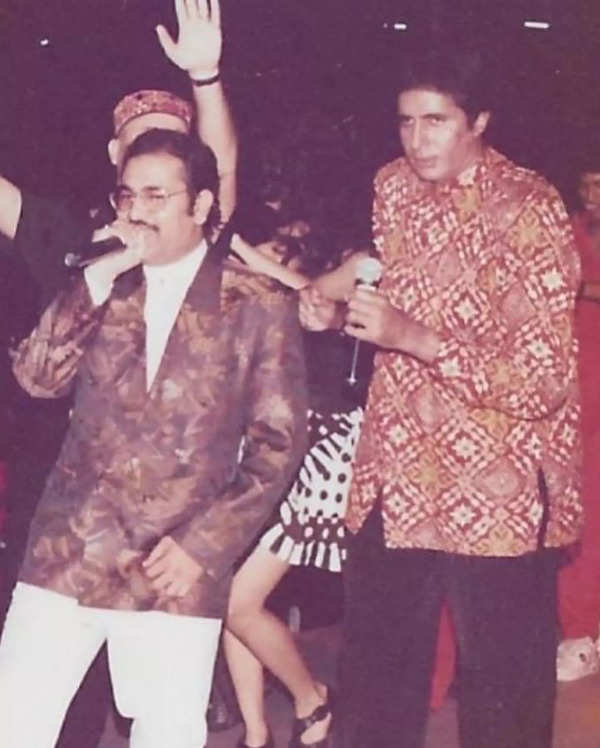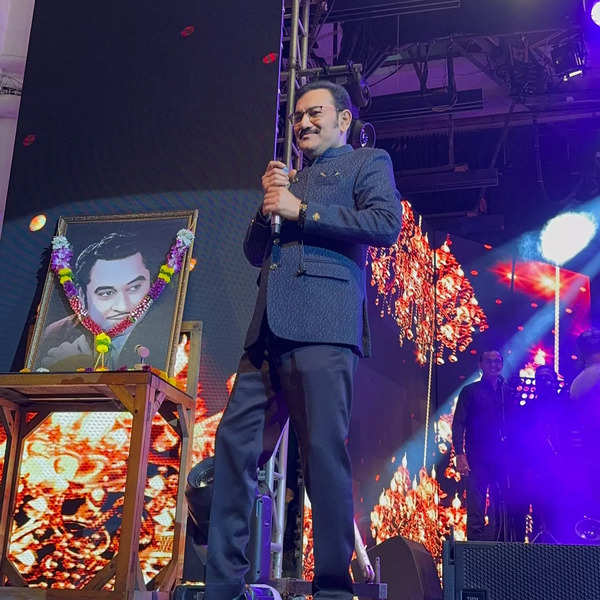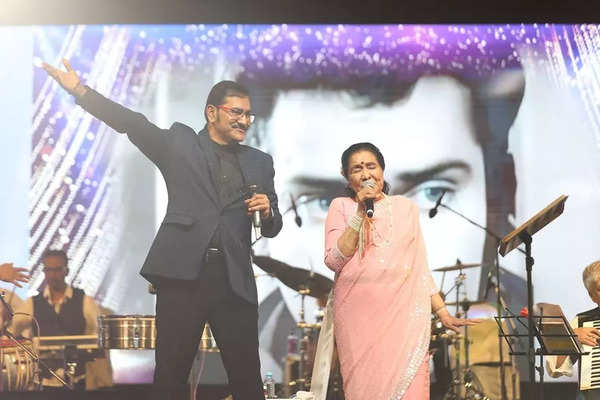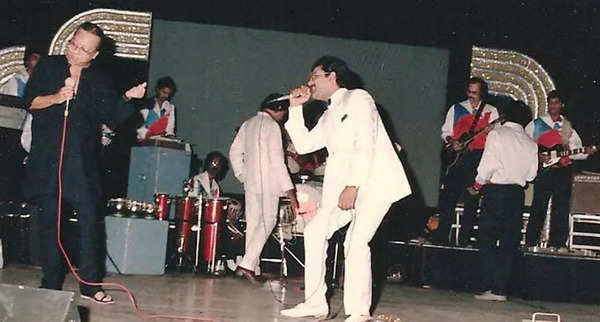Sudesh Bhonsale’s journey in music and mimicry began in a household rich with classical music and the arts, influenced by his mother, a classical singer, and his father, a painter.In an exclusive conversation with ETimes, Bhosale candidly shared the events which catapulted him into the spotlight during the golden age of Indian orchestras in the ’70s and ’80s, his association with Kishore Kumar, whom he considers his guru, admiration for Asha Bhosle and Amitabh Bachchan, who supported and encouraged him throughout his career, and his views on the current state of the music industry.
You have been honored at the Maharashtra State Film Awards for your many contributions in the Indian film industry. How are you feeling about this recognition? What emotions are you experiencing?
I am very happy. I never expected to win an award, but receiving one from my state government makes it even more meaningful. It is a very prestigious award, and I am extremely proud of it. This recognition brings motivation, inspiration, happiness, and a sense of responsibility. I am deeply grateful to the government for giving me this opportunity.
How important are these awards to you?
Actually, in any field, if someone receives recognition or appreciation, they naturally feel happy. Especially for an artist, recognition brings a lot of emotions and sentiments. When you suddenly get a call saying you’ve been selected for an award, it’s a pleasant surprise, and I’m very happy about that. Personally, I don’t work for awards. I focus on the art that God and my parents have blessed me with, dedicating myself to it 24 hours a day. When I receive an award, it’s a natural outcome of that dedication.
Your musical journey has been extensive and remarkable. Can you share how it all began and what the major turning points were?
Basically, my mother Sumantai Bhonsle was an Indian classical singer, and my grandmother Durgabai Shirodkar was a very famous singer as well in All India Radio. My father N.R. Bhonsle was a painter who made film posters in the ’50s and ’60s for well-known productions like V Shantaram ji, Raj Kapoor ji, Dilip Kumar Sahab, Mughal-e-Azam and Rajshri Productions. From a young age, I was surrounded by classical music and painting at home. I started painting film posters when I was 14 and continued until I was 22 (From 1974 to 1982). Although I dabbled in music, my painting was so good that I never imagined pursuing a career in the arts.
In the ’70s and ’80s, I developed an interest in singing with different voices, like those of SD Burman Sahab, and Saigal Sahab. I started performing with my friends, and one day, I discovered I could mimic Amitabh Bachchan. Mimicry wasn’t my original intent, but it came naturally. Over time, I mastered the voices of 22-23 playback singers and 28-30 actors. Gradually, I transitioned from painting to the stage, and by the ’80s, my brush had been replaced by a microphone.
The ’70s and ’80s were the golden age of orchestras and mass entertainment, and I became popular for my unique voice. Mimicking artists used to do Ashok Kumar, Om Prakash, Raj Kumar and Dilip Kumar, I began mimicking voices like Vinod Khanna, Sunil Dutt, Asrani, Anupam Kher, and Ajit. My mimicry of Amitabh Bachchan’s voice, which no one had heard on stage before, drew a lot of attention. Soon, I became known as the boy with different voices, and I got busy with orchestra performances.
Then, I joined Melody Makers, India’s oldest group since 1961, and participated in almost every live show by Kishore Kumar, whom I consider my guru. I anchored and performed Md. Rafi’s songs on stage with him from 1982 to 1987. One day, when Asha Ji heard me sing in Sachin Dev Burman’s voice, she became emotional and introduced me to Pancham Da, who was also deeply moved by listening to his father’s voice. Since then, Asha Ji had been taking me to all her tours, performing in shows across the world.
Amitabh Bachchan himself was amazed by my voice. He told me, ‘Bhaiya, humari aur aapki awaaz to bohot milti julti hai, mujhe to pata hi nahi chala gane me ye nikal raha hai.’ Then he took me on world tours after I sang Jumma Chumma for him. Step by step, I received immense support from legends like Kishore Kumar, Lata Ji, Asha Ji, Amitabh Bachchan, Jeetendra, Sridevi and others from the ’80s. They loved me for my talent, and I never made fun of anyone; I always showed respect to my seniors.

Over time, I got tired of mimicry and decided to stop thinking ‘where is my voice’ in between all these. People would approach me during intervals, asking I didn’t mimicked Asrani, Ajit and others that day. After Sanjeev Kumar’s death, I dubbed five of his films, including Love and God, Oonch Neech Beech, and Professor Ki Padosan. I also dubbed for Anil Kapoor in Tezaab. Without any formal training, I started doing lipsync dubbing at that time when there were no computers, and gradually, one opportunity led to another.
In 1990, I had the chance to sing in the voice of an actor for the first time, and many people still don’t know that I sang hit songs like Jumma Chumma, Meri Makhna, Shawa Shawa, Sona Sona, and Bade Miya. I sang for actors like Anil Kapoor, Govinda, Mithun, and Jackie Shroff. I have lent my voice to songs like Bhangda Pale, Laal Dupatte Wali, Jhankaar Beats, Bachke Tu Rehna and many more. Whenever I sang for Amit Ji, the songs became instant hits. But people didn’t know that it was my voice. So that’s how my voice for Amit ji became well-known.
Today, I continue doing live shows, recordings, and voiceovers. I have my own studios in Goregaon, and I still get involved in TV shows like K for Kishore, where I was a judge alongside Amit Kumar and Bappi Lahiri. Singing in different voices and dubbing remain my passion. I am still dubbing for Amit ji in ad for other languages. I’ve sung Jumma Chumma in 19 languages, and I’ve also sung in Marathi, Hindi, Bhojpuri, and Bengali. My fans are everywhere, and I’ve had the privilege to work with so many legends. God has really blessed me with this talent.
Looking back, it’s been a wonderful journey on stage, in films, and on TV. I’ve met many good people along the way, including those who consider me their guru. Legends like Lata ji, Asha Ji and Amit Ji have taken me on world tours, and I’m grateful for all the love and support I’ve received.
As you mentioned, Kishore Kumar ji had a great admiration for you, and you worked with him for five years, either dubbing or singing for him. Can you share your experience working with him and describe his aura?

I think Kishore Kumar was an incredibly talented artist, a once-in-a-thousand-years talent. He was so versatile and an all-rounder, unpredictable in the best way. He could do anything at any time. Some big singers told me, during a recording, everyone was always prepared and performing their best, but when Kishore was with them, they would get a little nervous. This man would do something entirely different in rehearsal and then surprise everyone with something else entirely during the actual take.
He was also a king on stage. Whatever he sang or did on the spot was always unique and different from what anyone else could do. I remember when Melody Makers turned 25 in 1986, he came to sing two songs for us, and no one could believe it—he did it for free. Normally, people would charge a lot, but not Kishore. For five years, I had the privilege of learning from him, traveling with him, observing his work, and experiencing his incredible aura.
As you’ve seen in many films, he often outshone the hero, sometimes even more than the comedians. I’ve seen interviews with people like Aamir Khan, Johnny Lever and others who said Kishore Kumar was more of a comedian. Many great comedians didn’t get as much recognition, but we always looked up to Kishore when it came to comedy.
He brought so much variety to his performances, whether he was singing for Rajesh Khanna, Amitabh Bachchan, Shashi Kapoor, or Rishi Kapoor. Often, you might know the song, but when you watch it, you think, “Oh my God, this hero almost ruined the song,” because Kishore’s singing turned him into a hero. Many films became hits because of his music, as he was an actor in his own right, bringing so much to the table with his incredible talent.
Do you have any memorable experiences or anecdotes about Kishore Kumar that you’d like to share?
There are many anecdotes, but one that stands out is when I once gave Kishore Da a cassette. He listened to it and asked me, ‘What was going on ‘ye tum meri awaaz me gate ho’. I heard the song once and thought, “When did I sing this song?” Then I listened to it again and wondered the same thing. After hearing it eight times, I finally realized at one point that something was off. ‘Ye mai nahi, Sudesh ho sakta hai.’ He then called his wife Leena (Chandavarkar) ji and asked her to listen to the song. She told him, “Dada, aap to acha hi gate ho. Mujhe aaj kyu pucha?” He insisted her and said ‘just listen.’ She told him it was very good. Then Kishore ji told Leena, “Areh pagal, ye mai nahi, Sudesh hai!”
He then called his son Amit Kumar and asked him to listen to the song. Amit replied, “Aap mujhe kyu puch rahe ho gana kaise gaya. aapne to acha hi gaya hoga.” He’s like, “Areh, tu sunn toh.” After hearing it, Amit said, “Areh baba, ye to bohot acha hai.” Again, Kishore ji told Amit, “Areh pagal, ye mai nahi, Sudesh hai!” So, I sang in front of Leena ji, and Kishore ji used to tell me, “Ye jitne gate hai, tu sabse acha hai re.” Every time we traveled, they would ask, “Is Sudesh coming with us?” They loved me so much.
Kishore Da also appreciated my mimicry in different voices. He would often ask me to sing in either his voice or other actor’s voice. When I sang in Sachin Da’s voice, he told me, “Jo baki log karte hai na, waise tu Saigal Sahab aur Sanjeev Kumar ka majak nahi karna. Mai unko bohot respect karta hu.” He really appreciated my work and showed me so much love. If you watch old videos, you’ll see me drinking water, and he treated me with such affection, like a child.
Asha ji also considers me as her child. During a world tour in Canada, Lata Ji once said, “Agar Bhonsle mere sath hote hai, to kisi male singer ki jarurat nahi padti.” Since 1986, Asha Ji, who is now 90, still calls me whenever there’s a show, saying, ‘Sudesh, mera show hai ek, mai tere sath hi comfortable hoti hu.’ I even used to sing in Amit ji’s voice alongside him on stage.
How did you develop your skills in mimicry and singing? What challenges did you face in perfecting them?
Actually, these voices came naturally to me. After that, I practiced a lot and perfected it. There weren’t many challenges. I met good people, and my colleagues were also supportive. However, after a while, music directors got confused about what to do with it because I could sing in everyone’s voice. When Jumma Chumma became a hit, people started to think that Sudesh can only sing in Amitabh Bachchan’s voice. So, there was a bit of a challenge in the middle. Even now, Amit Ji jokes, “Areh ye ho kya raha hai. Mai gata hu to log kehte hai, ‘Sudesh Bhonsle gaa raha hai.'”
Who has been the biggest influence in your life, shaping you in a positive way?

First of all, my mother’s influence has been the biggest one, along with the values my parents instilled in me. Secondly, wo kehte hai na jo sar par hath rakha, wo Asha Ji ne. These two ABs, Asha Bhonsle and Amitabh Bachchan, are very important in my life. Now, Asha Ji is 90 years old, and she is still working hard. Even at 90, Asha Ji continues to practice. If she can do it, then we certainly can too. What I’ve learned is that whatever work you get, do it with hard work and honesty. Leave the rest to God. Don’t work just to get a hit or an award—do it with sincerity.
So, in today’s music industry, we see that not so many good songs are coming out. Even now, all the old songs are being remixed if someone wants to make a hit film. Do you think that this talent is gradually decreasing? Or do they need guidance?
Actually, the issue isn’t a decline; it’s that the style has changed. What’s happening now is that technology has become dominant. Everyone is relying on computers and synthesizers. Youngsters believe that if they become skilled music engineers, they can achieve anything. For example, songs are being released in Lata Ji’s voice, with one song by Arijit and another antara by Rafi ji. So auto-tuning and AI are being misused a lot.
To become an artist, you should first learn the art and practice it diligently. In the beginning, we didn’t know how to do it, but once we gained recognition, we began practicing seriously. We are still working hard to maintain our skills. Today, many people think that it’s easy, but it’s not. You can’t just create a song on a computer and expect it to go viral; there’s more to it than that.
Many people think that becoming famous will automatically bring in money. Many youngster come to music classes and they ask how many months it will take to learn or how much money is required. Art isn’t like that; it’s not an interior decoration or building that we are going to build. The more you learn, the more you realize how much there is still to learn. Every show and recording is a new opportunity to improve. I feel that what I did yesterday could be better today.
Listening to legends like Lata Ji, Asha Ji, and Kishore Ji, I realize there’s always more to strive for. It’s a vast field, and shortcuts can be detrimental. If you become a star overnight, it often leads to problems. It gets into your head and it doesn’t even last longer. Achieving success step by step helps you understand its true value.
Just as you don’t jump straight to college, but start with nursery and progress gradually, becoming an artist requires time and effort. Some people expect to become experts immediately, but mastery comes through experience and persistent effort. Some people think they have already done their PhDs in music after viral songs. ‘Ye zamana alag hai, fast hai sab kuch. Abhi ke log talented bhi hai, confident bhi hai. Aur hua kya ye mobile ne sab gadbad kar diya. Mata pita se jyada Google aunty par bharosa ho gaya sabko.’
Is there a favorite singer of yours right now?
After Kishore da, if there’s any singer who has a broad voice, is Udit Narayan. After Udit ji, I admire singers like Sukhwinder Singh and Javed Ali. However, I would say that if Udit Narayan were to sing for actors like Sunny Deol, Salman Khan, and Shah Rukh Khan, it would looks like they are only singing. This is the key difference between a singer and a playback singer.
Being a singer is as important as being an actor. That’s why names like Lata Ji and Asha Ji are so iconic. When you hear their voices, you instantly know who the hero or heroine is. Producers often say, “This is a hit song,” and they want it crafted in a specific way. Nowadays, everyone wants fast results, which affects the quality. It is everyone’s fault. ‘Sabko fast food chahiye, jab ke unko malum hai ye tabiyat ke liye acha nahi hai.’
People don’t have the time they once did. In the past, people would watch a Test match for five days. Now, matches are 20-20, and in the future, they might be even quicker like 10-10. Similarly, people don’t have the patience for a full three-minute song; they can skip to the next part in seconds. This rapid pace shortens the life of everything.
Do you like the remixes of old songs that are being made now? What are your thoughts on them?
There was a song ‘Apni to Jaise Taise, sung by Mika Singh. That song was being awarded at an award ceremony. And the song’s original composer duo Kalyanji-Anandji, were sitting right next to me. They did not even get a mention. Another such example, the song Aankh Marey, featuring Arshad Warsi, was originally composed by Viju Shah and sung by Kumar Sanu. But nobody knows that Viju Shah has composed the song. If a song wins an award, it’s between the creator and the main artist. The main artist didn’t receive an award for that; I got a remix award instead.
If the story is being used properly, a remix isn’t necessarily a bad thing. However, many iconic melodies, classics should not be altered. There should be limits. When something exceeds those limits, it gets ruined.
Which do you enjoy more: playback singing or performing on stage?
Both have their own appeal, but the thrill of performing on stage is different. You get an instant response, which boosts your energy and shows you how much people love you. In the studio, you can sing a song again if needed, but on stage, you don’t have that luxury. Performing live requires a lot of experience and confidence, which comes from practice. Some people may practice for 24 hours at home, but still feel nervous when they get on stage. Therefore, there needs to be a balance between studio work and live performance.
Has anyone from the audience ever made a strange request during your stage performances?

It’s strange, but as I mentioned, I once sang in the voice of Raj Kumar (sings normally ‘Imli ka boota, beri ka ped,’ sings in Raj Kumar’s voice ‘Imli khatti, meethe ber’). Someone thought I could pull it off, and I did. And those songs also became hits. Then, there was another song in Tirangaa featuring Nana Patekar and Raj Kumar (sings normally ‘Peele peele o more raja’, sings in Raj Kumar’s voice ‘Peele peele o more jaani’). I also sang in the voice of Anupam Kher—many times, in fact. People often ask me to sing in the voice of Amitabh Bachchan, SD Burman, Kishore Kumar and others and I enjoy singing in various voices on the spot as much as possible because it makes people happy. Whenever I am on stage, people usually feel good and assured that he will add a fun element to the performance. My comic timing is good, which comes from experience. Even though I’m generally a shy and serious person, sometimes I can’t believe how I am doing all this. But, well, that’s the nature of it.
If you had to share something with your fans that might surprise them—something they don’t already know about you—what would it be?
The key is to remember that fans and artists are interconnected. Artists shape our public image and influence how we’re perceived. They can elevate us or bring us down in an instant. I’ve always aimed to provide good entertainment—free from vulgarity or jokes about any senior figures. Whether it’s on TV, on stage, or in songs, I strive to maintain respect and dignity in all aspects of my work. I don’t want anyone to come up to me and say, “What are you doing on vulgar TV these days?”
I deeply respect the art that God has given me and never take it lightly. I would feel like saying that I will be able to mimic Amitabh Bachchan even in my sleep. The day I will say this, I may come to know that instead of Amitabh Bachchan, I am giving out Rajpal Yadav’s voice. ‘Apne aap ko bhagwan banne se bachna chahiye.’ All this is happening by the grace of God. I am saying this from my experience. The success of a show isn’t solely based on the quality of the voice; sometimes a show is a hit despite a less-than-perfect voice, and other times, a good voice doesn’t guarantee a response.
Success, money, and fame come not just from talent but from a combination of factors including hard work, the support of others and the wish of God. Being grounded and respectful, regardless of one’s status, is crucial. Treat everyone with respect, whether you’re climbing up or facing challenges. Recognize that everyone who supports you is like a guiding figure, and always stay humble.
How would you like people to remember you? What kind of legacy do you want to leave behind?
The award was announced a week ago, and since then, I’ve been receiving calls from all over the world. More than me, the people who know and love me are thrilled and feel that I truly deserve this recognition. Some are saying that I received the award late, but it’s not about the timing; it’s about the recognition itself. People should be happy for me rather than questioning why I received the award.
I want to be remembered as both a good artist and a good person. I never want people to speak ill of me because I know many follow and watch my work. There are many artists who, once they become famous, face criticism and negativity. People are clever, they understand everything.

